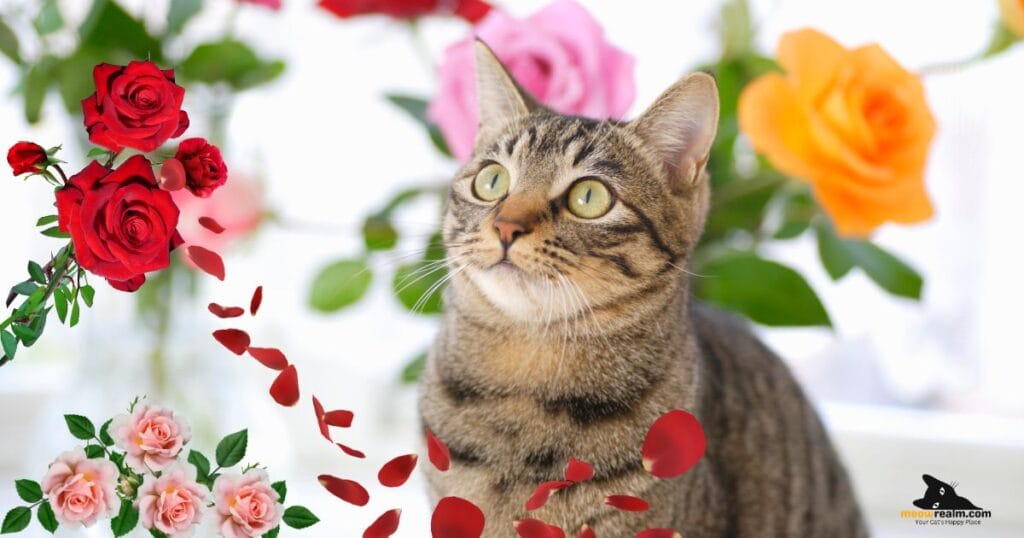Imagine an afternoon where you’re relaxing at home, maybe tending to the blooms in your garden or enjoying a bouquet of roses on the table. Your curious cat, always exploring, wanders over to investigate the flowers. It’s a beautiful sight until you wonder—could roses be dangerous for her? As a pet owner, you want to make sure every part of your environment is as safe as possible for your beloved companion. This article will explore the key details about roses and their potential risks, offering the guidance you need to keep your furry friend protected.
Table of Contents
Are Roses Toxic to Cats?
The good news for cat owners is that traditional roses, specifically those from the genus Rosa, are generally non-toxic to cats. If your cat has a habit of nibbling on petals or leaves, you can rest a bit easier knowing that the typical rose plant won’t pose a poisoning risk.
However, non-toxic doesn’t mean risk-free. Roses, particularly those with thorns or treated with pesticides, can still harm your pet if she’s overly curious. For example, thorns can cause injuries if cats attempt to bat or chew on them, and some pesticides are harmful if ingested. Being aware of these potential dangers can help you create a safer environment, whether your roses are in a bouquet or in your garden.
Potential Risks of Roses for Cats
While roses themselves are not toxic, other risks associated with them can potentially harm your pet. Let’s look closer at two main hazards: thorn injuries and chemical exposure.
Are Rose Thorns Dangerous for Cats?
Rose thorns might seem like a minor concern, but they can be a real hazard if a cat tries to interact with the plant. Cats are naturally inquisitive, often pawing or sniffing unfamiliar objects. If they get too close to rose bushes, especially when exploring outdoors, thorns can easily scratch or puncture delicate areas like their nose, paws, or face. These minor wounds might be prone to infection, especially if your cat spends time outdoors or near dirt.
If your cat shows a particular interest in your roses, consider removing or trimming thorns on lower branches or using a rose cover to protect them from accidental injuries. These steps can help make your home or garden a safer space without sacrificing your enjoyment of the flowers.
Do Roses Have Chemicals Harmful to Cats?
Roses, especially those from nurseries or stores, are often treated with fertilizers or pesticides that can pose risks for pets. While fertilizers add nutrients to plants, the chemical residues can be dangerous if cats come into contact with them. Pesticides and preservatives, used to protect flowers from pests or to extend the life of cut roses, may linger on petals and leaves.
If your roses are store-bought or come from a garden center, consider rinsing them thoroughly before bringing them indoors. Using organic or pet-safe gardening practices for roses in your yard can also help reduce these risks. Here’s a list of common chemicals to avoid in household or garden roses:
- Organophosphates
- Insecticides with carbamates
- Certain fungicides
- Synthetic fertilizers
By using organic or pet-friendly alternatives, you can enjoy your roses and peace of mind at the same time.
Symptoms of Plant Toxicity in Cats – are roses toxic to cats
Recognizing the Signs of Toxicity – are roses toxic to cats
While roses are unlikely to cause poisoning, any unusual plant could lead to gastrointestinal upset in cats. Here’s a list of symptoms that indicate possible toxicity:
- Vomiting
- Drooling or excessive salivation
- Lethargy or unusual drowsiness
- Lack of appetite or refusal to eat
- Disorientation or changes in behavior
If your cat displays these symptoms, it’s best to observe her closely and, if symptoms persist, contact your veterinarian.
What to Do if Your Cat Ingests Roses or Related Plants
If you suspect that your cat has ingested a rose or a potentially toxic plant, it’s essential to act quickly. Begin by carefully removing any remaining plant pieces from your cat’s mouth and paws. After that, keep an eye on her for any unusual behavior. If symptoms develop, here are steps you can take:
- Call Your Vet: A veterinarian can provide the best advice based on your cat’s symptoms.
- Contact Pet Poison Control: Reaching out to poison control can be an additional resource if your vet is unavailable.
- Monitor Closely: Even if no symptoms appear immediately, keeping an eye on your cat can catch any delayed reactions.

Safe Alternatives to Roses for a Pet-Friendly Home
You don’t have to give up flowers altogether to create a safe home environment for your cat. Many beautiful, pet-safe flowers offer a delightful option for your home or garden.
List of Cat-Friendly Flowers
Here are some safe flower varieties you can consider:
- Marigolds: Bright and cheerful, marigolds are safe for cats and easy to grow.
- Orchids: Elegant and diverse, orchids make a lovely indoor choice.
- Zinnias: Hardy and colorful, zinnias thrive outdoors and won’t harm your pet.
- Sunflowers: These friendly blooms are both cat-safe and visually striking.
These options provide the same vibrant colors and fragrances without the potential hazards. A safe garden space can keep your pet protected while allowing you to enjoy a rich floral environment.
Creating a Cat-Safe Garden Environment
Beyond plant selection, there are steps you can take to make your garden even safer for your cat:
- Netting and Barriers: These can prevent cats from getting too close to plants with thorns or treated areas.
- Organic Products: Avoid synthetic fertilizers and opt for organic options that are safer for pets.
- Routine Checks: Regularly check plants for signs of pests or mildew, addressing these issues organically.
DIY Rose Petal Cat Treats Recipe
If you’d like to involve your cat in your rose enjoyment, here’s a safe, homemade treat recipe. Only edible roses like Rosa rugosa should be used, and they must be free from any chemicals or pesticides.
| Ingredient | Amount | Notes |
|---|---|---|
| Organic rose petals | 1/4 cup | Pesticide-free only |
| Catnip (optional) | 1 tsp | Adds an enticing flavor |
| Plain cat-safe yogurt | 1 tbsp | Unsweetened and additive-free |
- Preparation: Rinse the rose petals thoroughly.
- Mix Ingredients: Combine the petals with the yogurt and catnip in a small bowl.
- Serve in Moderation: Give as an occasional treat to avoid overindulgence.
By following this recipe, you can share a safe, fun moment with your cat.
FAQ – Are Roses Toxic to Cats?
Q: Are all roses safe for cats?
A: Traditional roses are generally non-toxic. However, be cautious with similar plants like the Christmas Rose, which is toxic.
Q: What should I do if my cat ingests a rose?
A: Watch for symptoms like vomiting or lethargy, and contact your vet if you notice any unusual signs.
Q: Can I use rose petals in treats for my cat?
A: Yes, if they are organic and free of chemicals. Try the rose petal recipe above for a safe option.
Conclusion are roses toxic to cats
In summary, while roses may be safe in small amounts, being mindful of thorns, chemicals, and potential ingestion is key to creating a safe environment for your cat. By learning about the plants around your home and garden, you can enjoy the best of both worlds—a beautiful floral space and a safe haven for your feline friend.
are roses toxic to cats


